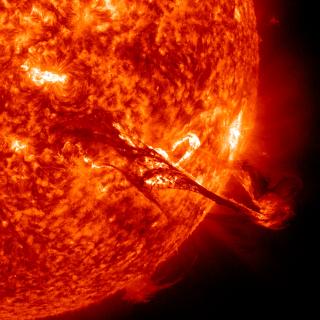Bibcode
Martínez González, M. J.; Bellot Rubio, L. R.
Bibliographical reference
The Astrophysical Journal, Volume 700, Issue 2, pp. 1391-1403 (2009).
Advertised on:
8
2009
Journal
Citations
145
Refereed citations
123
Description
We investigate the emergence of magnetic flux in the quiet Sun at very
small spatial scales, focusing on the magnetic connection between the
photosphere and chromosphere. The observational data consist of
spectropolarimetric measurements and filtergrams taken with the Hinode
satellite and the Dutch Open Telescope. We find that a significant
fraction of the magnetic flux present in internetwork regions appears in
the form of Ω-shaped loops. The emergence rate is 0.02 loops per
hour and arcsec-2, which brings 1.1 × 1012
Mx s-1 arcsec-2 of new flux to the solar surface.
Initially, the loops are observed as small patches of linear
polarization above a granular cell. Shortly afterward, two footpoints of
opposite polarity become visible in circular polarization within or at
the edges of the granule and start moving toward the adjacent
intergranular space. The orientation of the footpoints does not seem to
obey Hale's polarity rules. The loops are continuously buffeted by
convective motions, but they always retain a high degree of coherence.
Interestingly, 23% of the loops that emerge in the photosphere reach the
chromosphere (16 cases out of 69). They are first detected in Fe I 630
nm magnetograms and 5 minutes later in Mg I b 517.3 nm magnetograms.
After about 8 minutes, some of them are also observed in Ca II H
line-core images, where the footpoints produce small brightness
enhancements.
Related projects

Solar and Stellar Magnetism
Magnetic fields are at the base of star formation and stellar structure and evolution. When stars are born, magnetic fields brake the rotation during the collapse of the mollecular cloud. In the end of the life of a star, magnetic fields can play a key role in the form of the strong winds that lead to the last stages of stellar evolution. During
Tobías
Felipe García